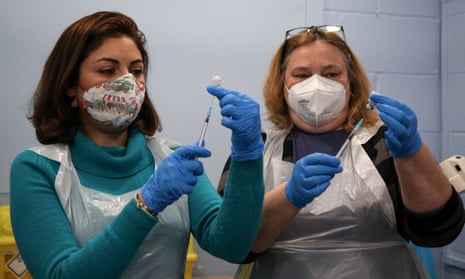In January 2021, my colleagues at the hospital were among the first to receive the Covid-19 vaccine. Comparing the side-effects afterwards, most of us had a sore arm, some of us felt feverish and generally under the weather, but one comment stood out. “My period was heavier than usual,” said one of the midwives. “But that happens to me every year after we get our flu vaccines, too. It’s just another of those vaccine side-effects, isn’t it?”
Was it? I’m an immunologist working in female reproduction and this was the first time I had heard of such an effect, but it didn’t strike me as implausible. We know that various stressors, physical and psychological, can influence the menstrual cycle and vaccination is certainly a physical stressor; those of us who were complaining of feeling under the weather could attest to that. And yet I wondered why, if this effect was as run of the mill as my colleague seemed to think, it wasn’t something I had heard before.
I found pieces of evidence here and there. Writing in 1549, the Chinese doctor Wan Chhüan casually mentions that inoculation against smallpox (an early procedure similar to vaccination) was liable to bring on menstruation unexpectedly. A report from 1913 noted that when a New York hospital started vaccinating its nurses against typhoid, a number of them noticed post-vaccination differences in their menstrual cycles. More recently, seven out of 16 women in a phase I trial of a Hepatitis B vaccine reported menstrual changes, while a survey of almost 30,000 Japanese teenagers found HPV vaccination weakly associated with an increase in heavy or irregular periods.
Perhaps my colleague was right and menstrual changes are just another vaccine side-effect. But clearly this wasn’t something that was widely researched or discussed. It was more of a curiosity than anything else.
But it didn’t stay a curiosity for long. At first, older and vulnerable people were prioritised for Covid-19 vaccination, but as the programme was rolled out to younger people, social media was suddenly alight with people saying they had noticed a change to their menstrual cycle after the vaccine. In the UK, Google searches containing the terms “period” and “vaccine” leapt in the first week of May 2021, and on TikTok peaks in the hashtag #periodproblems seemed to coincide with the timing of initiation of vaccination programmes around the world. Coming at a time when vaccine hesitancy among young women was being driven by false claims that Covid-19 vaccination could harm their fertility, the possibility that vaccination might cause changes to the menstrual cycle was, understandably, worrying for many people. Research was needed, not least because failing to properly investigate the potential link would fuel these fears.
Menstrual cycles vary naturally, so without formal studies it was impossible to know whether Covid-19 vaccination really did cause changes, or if people were simply becoming more aware of changes that would have occurred whether or not they had been vaccinated. With this in mind, the US National Institutes of Health allocated $1.67m to investigate the potential link in US residents. The Norwegian Institute of Public Health repurposed a cohort of young adults it had recruited to look into other Covid-19 vaccine effects to see if there was an impact on the menstrual cycle. In the UK, no specific funding was available, so my team started two small studies on a shoestring.
The results from those studies have been published this week. We found that getting a Covid-19 vaccine could delay your next period by a day or so, but the timing of periods returned to normal in the following cycle. A much larger study from the US found the same thing. Interestingly, we found some evidence that this delay was less likely to occur in people taking combined (but not progesterone-only) contraception, suggesting that the effect may be mediated by temporary changes to sex hormones. The Norwegian study found that about 8% of people reported a heavier than usual period the cycle before their vaccine, but this increased to 14% in the period after they were vaccinated.
The results of these studies are reassuring: the changes are small and short-lived, and we know from other studies that Covid-19 vaccination does not affect female fertility. They are also validating: the people who noticed a change in their periods were right to tell doctors and scientists about their experiences, and we were right to listen. Scientists are increasingly asking patients and the public to guide us in framing research questions that are relevant to them, and this story illustrates the benefits of doing this.
But there is more to be learned. The clinical trials would have provided the ideal setting to differentiate between menstrual changes associated with Covid-19 vaccination and those that occur in the placebo group, as part of normal variation. Participants were not asked about their menstrual cycles, so this opportunity was missed. This happened, at least in part, because menstrual and reproductive health has traditionally been an afterthought in medical research. We should do better in the future.
Viki Male is a lecturer in reproductive immunology at Imperial College London
Do you have an opinion on the issues raised in this article? If you would like to submit a letter of up to 300 words to be considered for publication, email it to us at guardian.letters@theguardian.com
